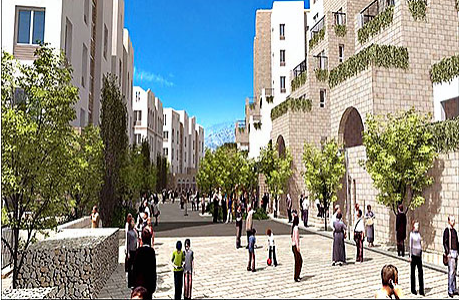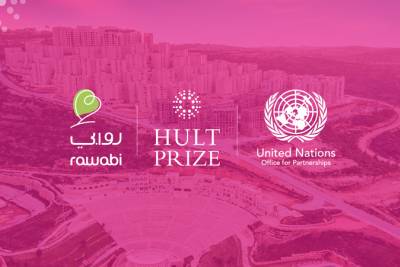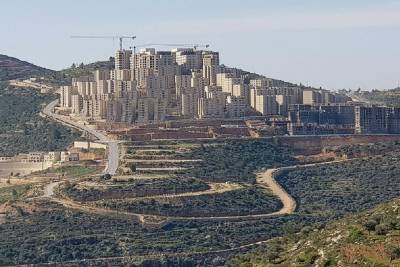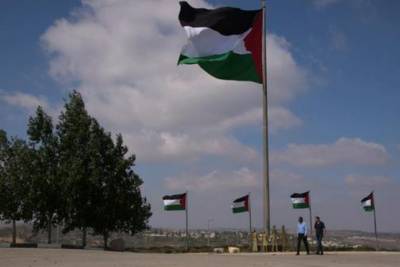Palestinian economy: City on the hills; Rawabi
Danny Rubinstein - Rawabi the new Palestinian city, to be established north of Ramallah, arouses interest before it’s marketing began
Bashar Al-Masri, the developer who building the first modern Palestinian city in the West, Rawabi (hills), says that even though they have not yet started to sell the first apartments within the project, 7000 prospective buyers already registered their requests to buy apartments through the the company’s web site. The site is certainly impressive, consisting of a series of rolling hills in one of the highest places in central Samaria, nine kilometers north of Ramallah.
Bashar is the grandson of the late Hikmat Al-Masri, who served as Chairman of the Jordanian parliament, and his family is known as one of the richest among Palestinians. After studying chemical engineering in the United States and settled there, he went into business world. He is a
partner in "Al-Ayyam" newspaper, and indulges in high-tech projects as well, though most of his time he devotes to Rawabi.
Even though marketing these 5000 housing units has not begun, yet we can witness from the hills overlooking the site, dozens of heavy tools that excavate the site, preparing for the new city infrastructure to materialize.
Beyond them, over the horizon, you can overlook one of the most spectacular sights in Israel: the coastal strip stretching from Hadera in the north, to Ashdod in the south. At the Center, you can behold the Azrieli towers with the blue sea background. Al-Masri says that so far, the Palestinian residential project barely consists of about 300 units, while he talks about launching thousands of homes in Rawabi, where about 25 thousand inhabitants will dwell there.
The developer and the contractors building the city did not need the money of homebuyers, because they have sound financial backing. It is from the construction company Aldiar, one of the largest in the Arab world, owned by the rulers of Qatar, which finances the Rawabi project
that will cost well over $ 850 million.
Simulation of the new Palestinian city
A new way of living
Rawabi heralds a revolution in Palestinian housing culture. Family tradition dictated permanent housing rules for most of the Palestinian public till to date. A son, who gets married, brings his wife home, and his parents, brothers and cousins, start adding a new residential unit, adjacent to the family big house or nearby. That is how, over centuries, big family neighborhoods, villages, towns and cities evolved and developed over hundreds of years.
In recent years, Palestinian cities have begun to crop up apartment buildings with dozens of tenants with no family relation between them, and the main reason behind this is the passage of many residents in villages to the cities. This is particularly noticeable in Ramallah, where most of the inhabitants today come from Jenin, Nablus, and Tulkarem who sought to work in public or governmental institutions in the city, or aimed to study and teach at the local college, or to develop trade and business in the city. A few years ago you would see every Thursday hundreds of cars leaving Ramallah heading to spend the weekend with their families at the villages.
Nowadays you cannot see the convoys of every Thursday, partly because of military roadblocks and inconveniences of the roads.
The transition to the cities has become one of the social phenomena that distinguish between Palestinian brethren in the West Bank and Palestinian citizens of the State of Israel.
Israeli Arabs, residents of the Al tireh, Qalansawa and Baka Al-garbiyeh do not live in or even pass Jewish towns, of Khadera or Petah Tikva, for obvious and cultural and social reasons.
Arab villages in Israel quickly become urban communities, while in the West Bank mostly rural nature of most communities was preserved.
Either way, what is delaying the work at Rawabi today is the lack of road access and water supply shortages. Prime Minister Benjamin Netanyahu promised indeed to help, but settlers living nearby do not allow it. Recently there was a course change , where MK Yaakov Katz of
the National Union, who lives nearby, declared that we should help the Palestinians build beautiful homes because eventually they will be expelled and Jews will live in those beautiful houses. After all, Katz added, that was the case in Ramle, Lod and Jaffa.
Bashar Al-Masri, who is building the new Palestinian city, has heard MK Katz, but it seems he was not impressed by that.
To view original article, Click Here.




